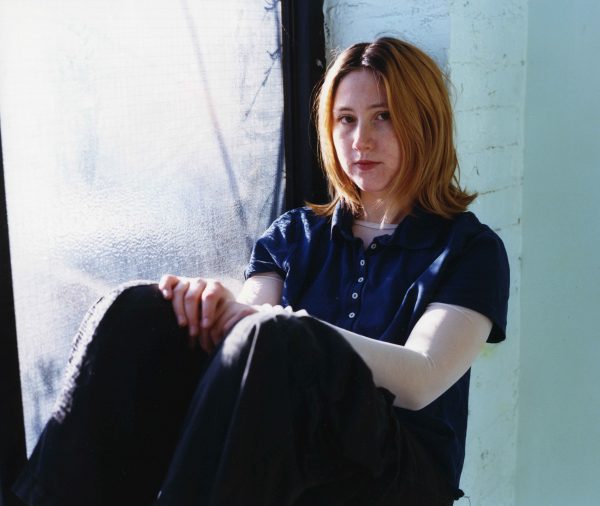
Presented by:
Triple D's
Jessica Lea Mayfield

Jessica Lea Mayfield
Jessica Lea Mayfield is singer songwriter hailing from rural Ohio, she’s been active since age 15 as a solo artist and grew up living in a bus and traveling around playing bluegrass festivals with her parents family band starting at the age of 8. She writes ominous Appalachian folk rock depicting love and relationships and human dynamics. Her 4th studio album is set to be released end of this year (produced by Daywave) and she is announcing east and west coast fall and winter tour dates.

Margaux
Margaux (born Margaux Bouchegnies) is a singer-songwriter based in Brooklyn, NY. Born to a French father and an American mother, Margaux grew up in Seattle. She picked up guitar first, then upright bass, and began writing songs inspired by Motown, Pixies, and Dirty Projectors. Bass in hand, she moved across the country to study jazz at the New School in Manhattan. Bouchegnies later switched into the writing program, where she graduated with a degree in poetry and non-fiction.She first performed original material as “Margaux” early in 2018, at a DIY show in Brooklyn. Although she was a virtual unknown at the time, her short set caught the attention of producer Sahil Ansari, as well as PJ Sauerteig of Massif Records. Sauerteig still remembers being awestruck at that first show: “Two or three songs in, everyone in the audience was looking around at each other, wide-eyed and aware that we were witnessing pure, timeless talent. The songwriting was just divine.”The next year, Massif Records released Margaux’s debut EP, “More Brilliant is the Hand that Throws the Coin” to instant critical acclaim: Pitchfork called it “uncannily wise and self-assured” (with a 7.8 rating), and booked Margaux for its Chicago festival that summer. In 2023, Margaux and Ansari returned to the studio to record “Everlasting Snow” and “Maple’s Loom”–a couplet inspired by the life and work of Emily Dickinson. Margaux’s background in poetry shines through in her lyrics, which are equal parts coy and crushing. Margaux is also an in-demand bass player: over the past few years, she’s recorded and toured with indie acts like Katy Kirby and Dougie Poole.“Inside the Marble” is Margaux’s first full-length studio LP. The album is her most mature and inspired work to date–at times breathlessly intimate, at other times sweeping and orchestral. Although the album navigates heartbreak through songs like “Ships” and “DNA,” it is more than a breakup album. Margaux also wrestles with the anxieties of how we grow up and build a life of our own. How we teeter between confrontation and avoidance (in “Dissolve / Resolve”) and end up hiding behind the boundaries we’ve drawn (in “What Could I Say?”).In Margaux’s own words: “The album’s common thread is really about making sense of big feelings. I do love songwriting as a craft but I think a lot of the time it is something I turn to amidst a spike in emotion, whether that is rooted in heartbreak, dread, feelings of love, or angst… these things can feel so unruly inside. Writing these songs has helped me gain a sense of direction and clarity in moments that have otherwise felt like complete internal chaos.” In that sense, the album’s title refers not only to its cloudy, rolling vortex of indecision and fear–it also refers (somewhat tongue in cheek) to the idea of “losing ones marbles.” On nights surrounded by tangled cables and piling laundry, these ten songs gave Margaux a reason to pull through the worst pangs of heartache and post-graduate dread.“Inside the Marble” was almost five years in the making. Demos for “Midnight Contact” and “Ships” date back to 2019, and Margaux and Ansari first began chipping away at the album the following year. In the doldrums of covid, they took an even more experimental approach to recording and layering sounds–like using a horse brush on carpet to get the percussive whish on “I Wouldn’t’ Want It Any Other Way.” The album’s final track “What Could I Say?” features birdsong that Margaux recorded at her grandmother’s house back in rural France. (Margaux and Ansari spent a week there in 2022, where songs like “What Could I Say” began to take shape).Over time, Margaux and Ansari tapped other friends to fresh out the arrangements, including: Willem de Koch (Fleet Foxes, The Westerlies) on trombone, Reid Jenkins (Ed Sheeran, Morningsiders, Taylor Swift) on violin, and Jonah Smith (Closeby) on backing vocals. Although grounded in Margaux’s signature voice and guitar, the songs come to life with synthesizers and orchestral flourishes–not to mention Ansari’s tape loops and percussion.Ansari also produced, recorded, and mixed each song: “The sonics of this record revolve around creating zones of deep contrast with organic sounds. We spent months experimenting with layers of harmonically dense sounds—vocal stacks, pedal steel guitar, weird tape loops, horns, transistor organs, string ensembles—really maximal stuff to try and pin down these sort of nostalgic, blown-out 70s soundstage feelings that are embedded in Margaux’s songs while framing it against small moments… intimate and fragile snapshots. Like the feeling of moving quickly between rooms, experiencing angular textures to create a feeling of existing in different places at once. The album was made entirely in small studios in New York so there was a certain degree of introspective imagination we tried to tap into—the fabrication of chaos and density and space without ever actually experiencing that abundance.”Massif Records will release the full LP in June 2024.

Little Gold
